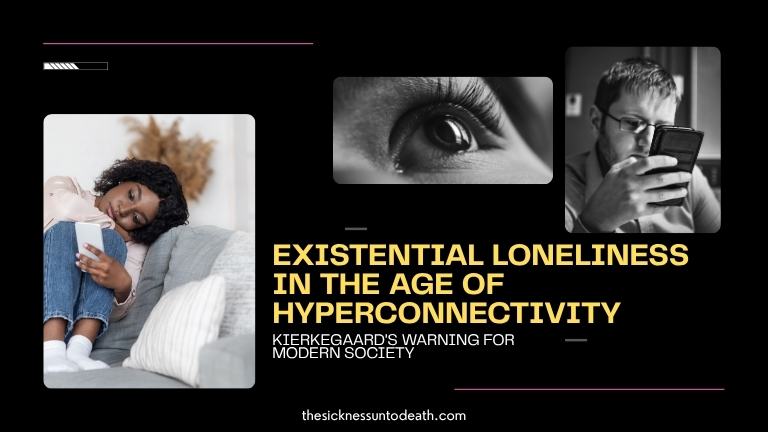In an age where we are more connected than ever—via social media, instant messaging, and always-on technology—it might seem strange to talk about loneliness. But many of us know the feeling: scrolling endlessly through feeds, replying to messages, attending video calls… yet still feeling profoundly alone. Danish philosopher Søren Kierkegaard, writing in the 19th century, couldn’t have predicted the internet, but his reflections on solitude and the human condition offer an eerily relevant warning for our hyperconnected world.
The Crowd vs. The Individual
Kierkegaard believed that truth, meaning, and authentic existence are found not in the masses but within the individual. He warned against “the crowd” as a force that can strip us of our individuality and responsibility. In today’s digital age, the crowd has gone virtual—but its influence is no less powerful. We curate online personas, seek validation through likes, and measure our worth against filtered versions of others’ lives.
Ironically, this constant interaction with others often leaves us feeling more isolated. Kierkegaard would argue that this is because we’re not truly connecting—we’re performing. In prioritising appearances over authenticity, we lose sight of ourselves.
The Silence of Solitude
Unlike loneliness, which is a sense of lack, Kierkegaard saw solitude as essential for self-discovery. It’s in moments of quiet, away from distraction, that we face who we really are. But modern life rarely gives us that space. Notifications, emails, and content streams demand our attention, making it difficult to sit with our thoughts.
Kierkegaard might say that many of us are running from ourselves—filling the silence so we don’t have to confront the deeper questions of existence: Who am I, really? What do I believe? What gives my life meaning?
The Crisis of Authentic Connection
Kierkegaard’s work highlights how despair arises when we are alienated from our true self. This kind of existential loneliness is not solved by simply being around people. It is cured by becoming a self in relation to something higher—what he called a “relationship with God.”
In today’s world, we often substitute that spiritual grounding with surface-level relationships and digital noise. But Kierkegaard would challenge us to seek something deeper: meaningful relationships built on vulnerability, truth, and love—not just convenience and image.
What This Means for Us Today
Kierkegaard’s insights are a powerful call to action for anyone feeling lost in the noise of modern life. Here’s how we might respond:
- Make time for solitude: Not just scrolling alone, but real, reflective solitude—reading, journaling, praying, or simply sitting without distraction.
- Pursue authenticity over approval: Resist the urge to perform online. Seek out spaces where you can be your full, unfiltered self.
- Prioritise depth over breadth: Fewer real friendships are more nourishing than hundreds of shallow ones.
Reconnect spiritually: However you understand it, Kierkegaard urges us to root ourselves in something transcendent—to move beyond the material and the immediate.
Despite being written over 150 years ago, Kierkegaard’s reflections feel more relevant than ever. In a world that confuses constant contact with connection, his philosophy reminds us of a timeless truth: it is possible to be surrounded by people and still feel alone. But by turning inward, embracing solitude, and seeking something beyond ourselves, we may just find the antidote to our age of existential loneliness.
Explore Kierkegaard’s timeless wisdom in greater depth with The Sickness Unto Death: A Modern Translation for the 21st Century—available now at www.thesicknessuntodeath.com. A powerful look at despair, identity, and what it truly means to be yourself.

